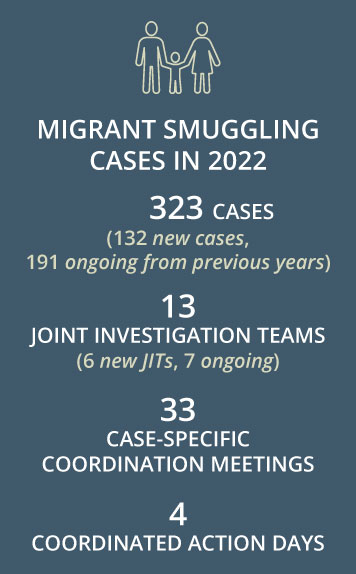
Operational support to migrant smuggling cases
Migrant smuggling is one of the fastest-growing cross-border criminal activities, calling for a global, multidisciplinary and transnational response. Efficiently fighting the OCGs operating worldwide by conducting successful investigations and prosecutions requires the specialised support and expertise that Eurojust is able to offer.
The Agency saw a steady increase in migrant smuggling cases in 2022, supporting more JITs, coordination meetings and action days to prosecute this crime compared to the previous year.
During 2022, Eurojust continued to implement the Roadmap for the implementation of the Renewed EU Action Plan against Migrant Smuggling (2021–2025), adopted by its College in December 2021. Through the renewed Action Plan, the European Commission has underlined the need to combat migrant smuggling via judicial and law-enforcement cooperation and reinforced cooperation with partner countries and international organisations. To this end, during 2022, Eurojust deepened its participation in EMPACT and enhanced its cooperation with third countries in the area of migrant smuggling.
Criminal network of migrant smugglers using private aircraft dismantled

October to December 2020 - Migrants pay an OCG up to EUR 20 000 for false diplomatic passports and a place on a private aircraft flying from Türkiye. Rather than continuing to their official destination, the migrants leave during the stopovers at European airports, dispose of their false passports and apply for asylum.
Autumn 2020 - At least five such smuggling operations take place in European countries. In addition to migrant smuggling and forging identity documents, the OCG is suspected of issuing false checks and scamming airlines, as well as defrauding hotels.
June 2021 - Eurojust supports the judicial and law enforcement authorities in Austria, Belgium, Germany, France, and Italy by setting up a JIT. During the course of the proceedings, Eurojust hosted four coordination meetings to facilitate judicial cooperation, which included the JIT members and the United States as participants.
13 September 2022 - An action day takes place and leads to 5 arrests (2 in Belgium and 3 in Italy); 7 house searches (1 in Belgium and 6 in Italy); seizures of 2 aircraft, EUR 80 000 in cash, 1 high-end car and electronic equipment; and EUR 173 000 being frozen in Italy.

Largest meeting ever of prosecutors combatting migrant smuggling held at Eurojust
In October 2022, Eurojust hosted the largest meeting ever of prosecutors who specialise in tackling migrant smuggling. In addition to participants from all EU Member States, prosecutors from the Western Balkans, Western Africa and the South Partner Countries[1] (SPCs) shared experiences and best practices.
The need for international and worldwide cooperation in the fight against migrant smuggling and human trafficking is now more paramount than ever. With the ongoing war in Ukraine and the increased flow of illegal migrants across the smuggling routes, the call for more intense judicial cooperation between all relevant actors is evident. Eurojust’s Annual Meeting on Migrant Smuggling has facilitated this important cooperation.
The 2022 Eurojust Annual Meeting on Migrant Smuggling provided participants with an overview of the latest developments in people smugglers’ operational models and routes. A wide range of international practitioners from 34 countries, including EU Member States and third countries, as well as specialists from Europol, the European Commission and UNODC, presented updates on the latest people smuggling techniques and how to improve international judicial cooperation. One insight noted is that organised criminal groups are extremely flexible, and changes in one smuggling route (e.g. the Western Balkans route impacted by the war in Ukraine) has repercussions on others (i.e. higher migratory pressure in Greece and Cyprus).
Enhancing cooperation with third countries was a key point of discussion. Participants discussed challenges for international judicial cooperation, including scarce resources and differences in legal frameworks (e.g. lack of a harmonised legal definition of migrant smuggling or differences in the weighting of the element of gain in migrant smuggling offences). Building up trust and direct contact between judicial practitioners across borders was identified as the best solution to overcome such challenges. Eurojust facilitates this cooperation at the institutional level through the EuroMed Justice Programme (EMJ) hosted by the Agency since 2020, and the more recent Western Balkans Criminal Justice (WBCJ) project, hosted by Eurojust since 2022.
Another focus of the meeting’s agenda was how to investigate the financial streams behind migrant smuggling groups that increasingly use cryptocurrencies. The alternative hawala banking system (based on trust and no official documentation), was also discussed as a means often used for transactions for migrant smuggling services. Participants examined cooperation via public-private partnerships, as well as the rise of so-called ‘digital smuggling’ (the use of social networks to publicise migrant smuggling services).
First face-to-face discussion on migrant smuggling with South Partner Countries
In May 2022, judicial practitioners from EU Member States and SPCs met for the first time in person to exchange operational experiences and best practices on preventing, investigating and prosecuting migrant smuggling offences, during a conference organised by the Greek Ministry of Justice. The conference took place within the framework of the EMJ, for which migrant smuggling is a strategic topic, and was supported by Eurojust and the European Judicial Network Secretariat.
The Conference focused on national actions by the Greek judicial authorities within the context of the renewed EU Action Plan on Migrant Smuggling. Furthermore, the implementation of the EMJ Strategy and Action Plan against migrant smuggling was discussed and the next steps elaborated.
The participants emphasised the importance of judicial and law enforcement cross-Mediterranean cooperation in countering migrant smuggling. They also expressed their commitment to continue working together towards the identification of synergies.
Eurojust becomes a member of the Joint Liaison Task Force on Migrant Smuggling and Trafficking in Human Beings
In September 2022, Eurojust became a member of the Joint Liaison Task Force on Migrant Smuggling and Trafficking in Human Beings, initiated by the Council and supported by the European Migrant Smuggling Centre at Europol. The Task Force focuses on intelligence-led coordinated action against criminal networks involved in migrant smuggling and trafficking in human beings. This joint platform allows law enforcement and judicial practitioners to work more closely together to identify networks, prioritise, prepare and execute cross-border operations. Thanks to Eurojust’s recent membership and active participation in bi-weekly meetings, the judicial component of migrant smuggling and human trafficking cases has been secured. As a result, the information flow and operational cooperation between Eurojust and Europol has significantly been stepped up.
The migrant smuggling Focus Group of prosecutors and investigative judges
The migrant smuggling Focus Group of prosecutors and investigative judges was established in 2020 to enable exchange between specialised practitioners working on migrant smuggling cases. The Focus Group, supported by Eurojust, assists Member States and third countries in their joint response to migrant smuggling cases. This includes: sharing lessons learned from landmark investigations; analysing new developments in the operating tactics of OCGs; studying the impact of shifts in migrant smuggling routes; and gathering input from practitioners on current challenges and opportunities in cross-border judicial cooperation.
Through the years, Eurojust has been active in assisting the national authorities dealing with migrant smuggling cases to ensure effective judicial cooperation and coordination in the field. With the establishment of the Focus Group in 2020, a step forward was taken by creating a hub for prosecutors and investigative judges dealing with migrant smuggling cases to exchange best practices, discuss challenges and connect with relevant judicial actors at the international level.
Over the past 2 years, the Focus Group has gathered more than 45 practitioners from the European Union and third countries, specialised in the fight against migrant smuggling. During 2022, Eurojust organised two virtual workshops and periodical newsletters for Focus Group members, while also enlarging the group’s membership to third countries.
[1] Algeria, Egypt, Israel, Jordan, Lebanon, Libya, Morocco, Palestine* and Tunisia.
* This designation shall not be construed as recognition of a State of Palestine and is without prejudice to the individual positions of the Member States on this issue.
